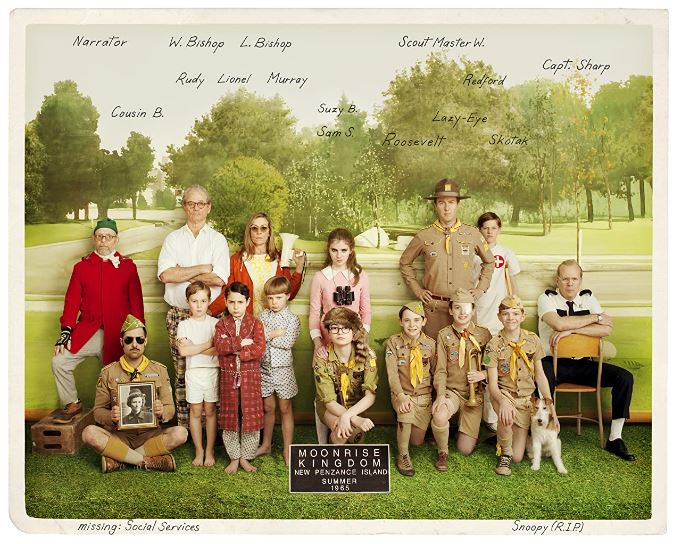A decade later, “Moonrise Kingdom” remains nostalgic — despite the film’s exploration of youth and its temporality. The story follows two 12-year-olds, Sam and Suzy, who live on an island off the coast of New England in the summer of 1965. The pair fall in love, they run away together and shenanigans ensue.
The movie feels sweet in its uniqueness. It‘s an atypical romantic adventure with serious thematic undertones if you look closely, but it is just as enjoyable without serious scrutiny. The film is aesthetically pleasing to watch with scenes painted with red and white coastal houses, checkered tile, sunlit greenery and fluffy clouds. Director Wes Anderson utilizes a mix of still, symmetrical shots and lively, tumultuous scenes to keep the viewer both engaged and pleased. The characters are an extension of the visual composition of the movie through both their carefully curated costumes and choregraphed mannerisms.
First, we see Sam’s khaki scout uniform and iconic raccoon skin cap, then Suzy’s pink collared dress, beret and saddle shoes. The pair are portrayed in the film as miniature adults, often more mature than their adult counterparts. Their costumes and looks reflect this: Suzy’s dark eye makeup, Sam’s habit of smoking, the nude watercolor drawings and their overall survivalist nature. They’re given a surprising depth for such young characters, which is often expressed through the simplest interactions.
“I always wished I was an orphan. Most of my favorite characters are. I think your lives are more special,” Suzy told Sam,
“I love you, but you don’t know what you’re talking about,” he responded.
Besides the two main characters, the film is packed with star power. Notably, Suzy’s father is played Bill Murray, a Wes Anderson regular, costumed in madras pants (a nod to New England prep style). Bruce Willis plays Captain Sharp, charged with finding and returning Suzy and Sam. The film also features a narrator, played by Bob Balaban in a bright red trench coat and green hat, who interrupts the story from a distance. Oscar nominated actor Lucas Hedges makes one of his first on-screen appearances, playing khaki scout Redford. “Moonrise Kingdom” was directed by Anderson, but was written by both Anderson and Roman Coppola, Francis Ford Coppola’s son.
The island where the film takes place is itself a symbol of their exile: Sam from the khaki scouts, the closest thing he has to a family, and Suzy from her parents, who are shown arguing over her elopement and her mother’s infidelity. The island also represents their inability to truly escape, as they feel trapped within their own lives. This reflects the teenage sensation of feeling condemned by parents or experiencing circumstances that seem unmovable in the moment. Simultaneously, they are condemned by time: youth is an island to the continent of life. At 12, Sam and Suzy are both fleeting and eternal, constantly changing but preserved through memories that feel like rich, vivid colors and French music. Innocent but adult, lovable but delinquent, restrained but free — the film itself is getting old but remains young.
Movie characters, like any other artistic product, hold the essence of their creator within themselves. They are fiction birthed from reality, an extension of consciousness. So, at its core, “Moonrise Kingdom” is about something that lives in a lot of us: the very troubled child, reflected in both Sam and Suzy.
Jack Burns can be reached at [email protected].



















